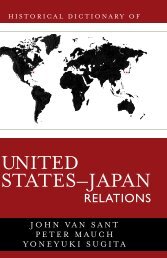New History Textbook (Chapter 4 & 5) 2005 version - Bakumatsu Films
New History Textbook (Chapter 4 & 5) 2005 version - Bakumatsu Films
New History Textbook (Chapter 4 & 5) 2005 version - Bakumatsu Films
You also want an ePaper? Increase the reach of your titles
YUMPU automatically turns print PDFs into web optimized ePapers that Google loves.
One of the main reasons behind the drafting of the Meiji Constitution in 1889 was the desire to<br />
revise treaties Japan had signed with other nations. Ultimately, Great Britain, then the most<br />
powerful Western nation, recognized Japan’s efforts toward modernization. The British, motivated<br />
by their desire to counter Russia’s inroads into the Far East, agreed to hold negotiations with Japan<br />
over treaty revisions. The labors of Foreign Minister Mutsu Munemitsu, the chief negotiator, bore<br />
fruit. In 1884, on the eve of the Sino-Japanese War, the Anglo-Japanese Commercial Treaty was<br />
signed and sealed. According to this treaty British citizens would be permitted to travel anywhere<br />
in Japan in exchange for the British renunciation of extraterritoriality. After Japan emerged<br />
victorious from the Sino-Japanese War, all of Japan’s treaty partners, including the U.S., agreed to<br />
abolish extraterritoriality.<br />
In 1911, after winning the Russo-Japanese War, Japan conducted negotiations with the U.S. during<br />
which it succeeded in regaining tariff autonomy. Japan’s quest for treaty revision, which began<br />
with the Iwakura Mission’s attempts at negotiations, was finally over after forty long years.<br />
<br />
Excerpt from Foreign Minister Mutsu Munemitsu’s 1893 address to the Diet<br />
concerning treaty revision<br />
The purpose of treaty revision, or more accurately, the purpose of Japanese<br />
diplomacy, is to possess the rights that any nation should enjoy and to carry out the<br />
responsibilities every nation should shoulder, to the fullest. In other words, although<br />
the Empire of Japan resides in Asia, we wish to receive special consideration from the<br />
Western powers — considerations not afforded to other Asian nations. Therefore, we<br />
must demonstrate that Japan forges policies and guidelines that do not exist in other<br />
Asian nations. We must also show that the Japanese people can elicit a special spirit<br />
of enterprise not found in any other Asian nation.<br />
(Mutsu’s speech emphasizes the significance of allowing foreigners to travel<br />
anywhere in Japan in exchange for the abolition of extraterritoriality.)<br />
55 The Movement for Freedom and Human Rights<br />
What efforts did the government and the freedom and civil rights movement make toward<br />
establishing a parliament?<br />
The Beginning of the Movement for Freedom and Human Rights<br />
The first principle in the Charter Oath of Five Principles (promulgated in 1868) declares that the<br />
establishment of parliamentary politics will be one of Japan’s fundamental policies. Later, several<br />
attempts were made to establish a parliament, but none of them was successful.<br />
In 1874, Itagaki Taisuke (and others who had left the government during the debate over sending a<br />
19













